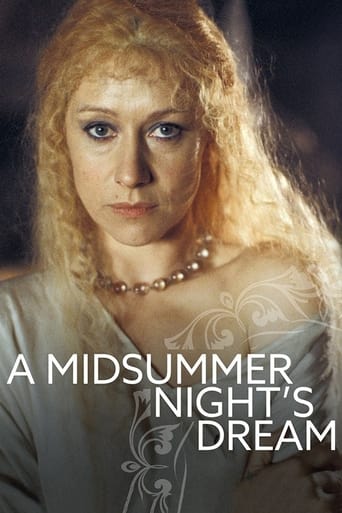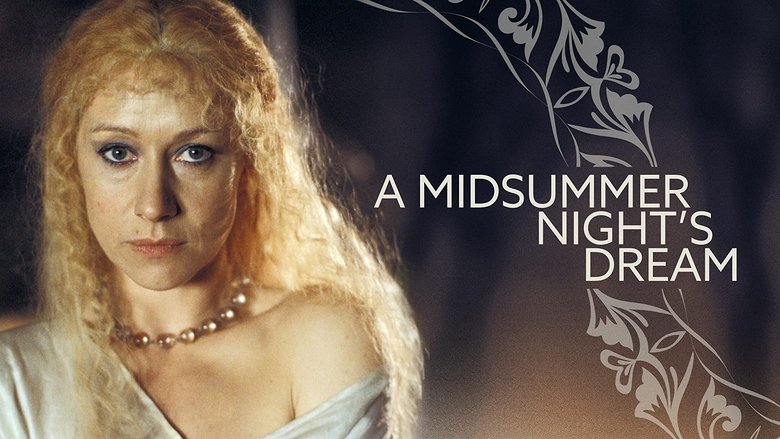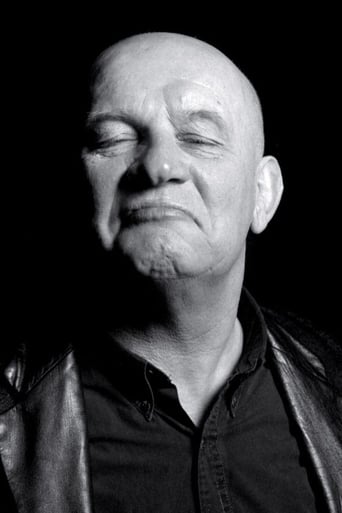A Midsummer Night's Dream (1981)
Four Athenians run away to the forest only to have Puck the fairy make both of the boys fall in love with the same girl. The four run through the forest pursuing each other while Puck helps his master play a trick on the fairy queen. In the end, Puck reverses the magic, and the two couples reconcile and marry.
Watch Trailer
Cast


Reviews
To me, this movie is perfection.
Although it has its amusing moments, in eneral the plot does not convince.
A film with more than the usual spoiler issues. Talking about it in any detail feels akin to handing you a gift-wrapped present and saying, "I hope you like it -- It's a thriller about a diabolical secret experiment."
The movie's neither hopeful in contrived ways, nor hopeless in different contrived ways. Somehow it manages to be wonderful
I think reviewers like tonstant have said it all.The main point for me is that Phil Daniels is way too weird and scary.Drugs and flick knives are fine for a weekend in Briton - but Shakespeare's words aren't a bunch of rockers on a Brighton pier to be repeatedly whacked over the head by an East End bike chain.(Imagine an angry Stephen Hawkins after having his computer reprogrammed by Bill Sikes and the volume set on full).Also, hobgoblin's (I guess) do what they do, not in slavish service to a tedious inner psychosis, but simply for the fun of it.But, there are a lot of things in the play which are very good, and for that, well worth watching.
A BBC, Time-Life production from the early 1980s, this TV adaptation of A Midsummer Night's Dream has all of Shakespeare's words but none of the magic. Trying to ensure that none of the text is left out, the actors deliver their lines at a breakneck pace, almost sounding like the debating team in Rocket Science. Consequently, much of Shakespeare's nuance and poetry is lost. This is a play that relies on myth and allegory to make its point which is essentially that reality is malleable and can be influenced by the spirit world for either good or ill, yet its treatment here is cumbersome and heavy-handed rather than light and playful.The play, replete with allusions to Greek mythology, is about a trio of mixed-up lovers: Hermia, Denetrius, and Lysander. Hermia's overbearing father Egeus is partial to Demetrius, his choice to be Hermia's husband. Indeed, Egeus' description in the play's first scene of his love for Demetrius sounds suspiciously like Shakespeare's entreaties to the fair youth in the Sonnets. In the same vein, Duke Theseus, who is marrying former enemy Hippolyta, sounds the refrain that the duty of a beloved youth is to make a copy of himself to preserve for future generations. Meanwhile Hermia is fixated on Lysander and will not consider anyone else as a husband, although choosing to disobey her father may lead to a potential death sentence or life as a nun which may be the same thing. To escape, Hermia agrees to run off with Lysander into the forest but naively conveys the information to Helena, a young maiden who longs for Demetrius.She follows Demetrius into the forest to try and stop Hermia and Lysander but they come upon a group of fairies who have their own agenda, leading to a romantic farce of mistaken identities caused by the fairies magical potions. One of the subplots concerns a theatrical troupe of workers who offer a play within a play that bring the proceedings to a comic high. The cast is competent but uninspired with the possible exception of Helen Mirren as The Faerie Queen. Nicky Henson as Demetrius and Robert Lindsay as Lysander seem too old for the part of young lovers and speak their lines with a clunky earnestness that is all wrong for the mood. Phil Daniels plays Puck with a demonic grin, belying the characters' playful nature. All in all, work of nimble grace is turned into an often incomprehensible shouting match that makes one long for some of the magic fairies potion - to sleep, perchance to dream.
After reading some previous comments, I can only conclude that some people were watching a different movie altogether. I found this version Of A Midsummer Night's Dream to be far superior to any other that I've ever seen .This is my favorite of all Shakespeare's plays, so I generally stand to be critical of the various treatments offered. However, I found this cast and direction to be outstanding, visually, and emotionally. The costumes were spectacular, the settings haunting, and the acting...flawless. I loved Geoffrey Palmer's work as well. I was lucky enough to catch a repeat of it years ago, and quickly taped it so I could watch it every summer.I themed my wedding after this play. I loved Helen Mirren's portrayal as the faerie queen, Titania. I found her to be perfect in the role. Judi Dench, I believe, played it all too 70s hippie-angsty, and could have done very well without the overexposure.The casting of an older boy as Puck, while at first seemed unfamiliar, and wrong, he quickly won me over, and soon his age didn't matter a bit. He sure beat a manic Mickey Rooney in the Hollywood version of 1935! Who, by the way, was 15 when he played the role.I saw some scenes on Youtube the other day, and the background music has been playing in my head for 2 days now. I'm hooked again.My birthday is next month..my husband is buying me the entire boxed set of the BBC Shakespeare comedies! Helen Mirren as Rosalind in As You Like It is superb again...as is John Cleese as Pertruchio in The Taming of the Shrew. I can't wait till next month...I'll be in Shakespeare Utopia.
There are two reasons why you might want to watch this version of Midsummer Night's Dream. One is Helen Mirren. She is lovely and perfect as Titania throughout and her delivery of the long monologue to Oberon in Act 2 Sc. 1 does not lose the viewer's attention for a moment. That is an awesome feat considering what a difficult passage it is.The other shining moment occurs in Act 3 Sc. 2, starting about when Demetrius wakes up to find that he is in love with Helena. The ensuing lines are delivered over top of each other, as the lovers engage in a confused quarrel. The actors add to this by pushing each other, trying to get around or over or under to talk to someone other than the one that's talking to them. Great directing and perfect timing make this scene race by like I've never seen it before.These two shining moments hardly make up for the rest of the performance which lacks sparkle. Some parts are sung (Puck's "Jack shall have Jill" speech) which is just incongruous. Perhaps the fact that Starveling sings his part as Moonshine is a bit of self-satire.Which brings me to the rude mechanicals who are particularly lacklustre. Geoffrey Palmer is absolutely wasted here. "Pyramus and Thisbe" is absolutely boring. There are exactly two bits of comic business (Bottom steals food from the wedding table on the line "'Deceiving me' is Thisbe's cue" and Starveling as Moonshine tries to upstage Bottom by hanging the lantern in front of his face) and they aren't exactly hilarious. If it's not funny, it should at least be moving, but although Flute (a very feminine Flute) tries, the director has cut most of the wedding party's backchat and they seem to have little interest in what is going on on the stage. Small wonder really.There's nothing about the sets and costumes, which suggest the English Civil War, to get us excited. The entire first scene is set in a library against a background of a ticking clock. What a great way to remind us how slowly the scene is moving!









